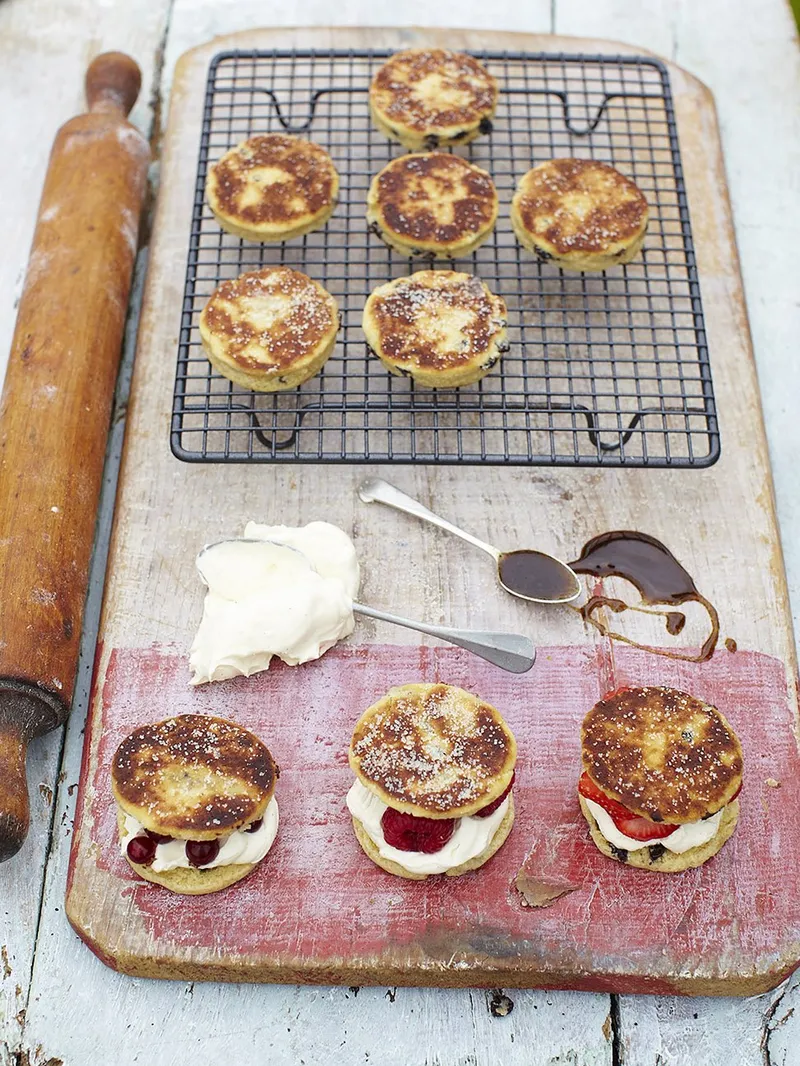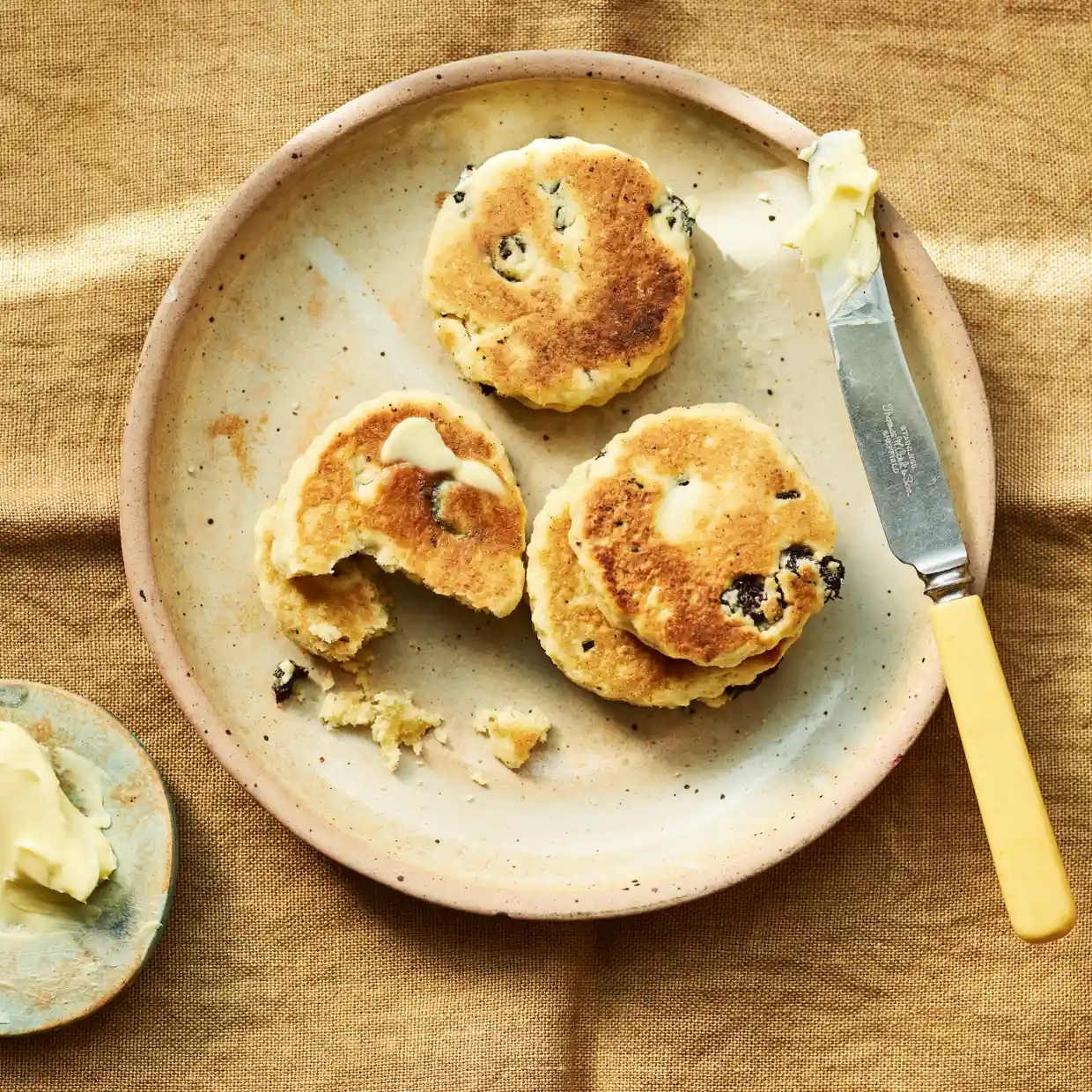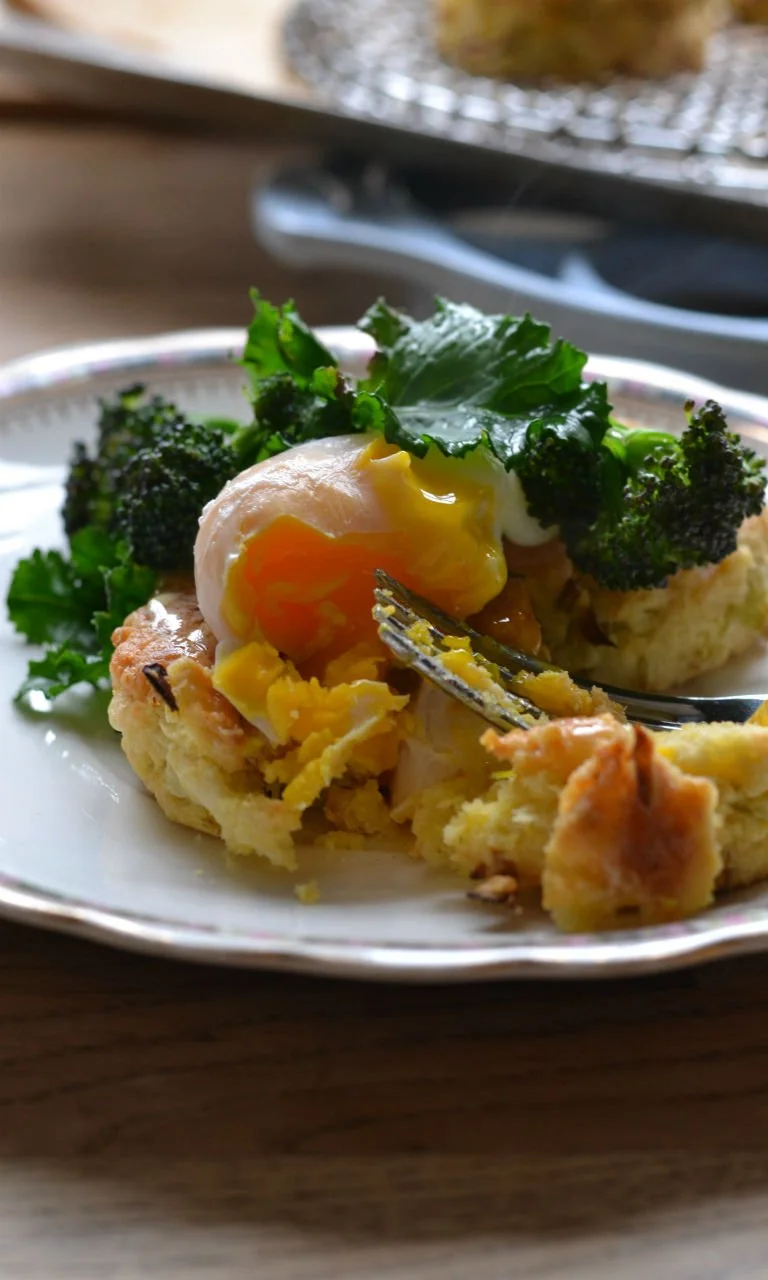Welsh cakes
- rosemary
- Jul 12, 2023
- 6 min read
"Unforgettably flaky, tender, almost melt-in-your-mouth texture that’s punctuated with sweet currants and laced with a wonderful hint of mace" The Daring Gourmet
"Pretty much a fried scone" Matthew Evans

Sitting on my desk waiting for attention and a post of it's own is a book by Anna Jones, a British vegetarian cook, whose food I always found interesting when she was writing a column in The Guardian. So when I saw her latest book One Pot, Pan, Planet on a special I bought it. One of the recipes that I thought looked interesting - probably because of the pretty picture, was this recipe for Green olive and herb Welsh cakes. I filed it away in my head, where it will probably hide for some time, as something that might make a good pre-dinner nibble for the family some time. But Welsh cakes. What were they? Hence this post.

Nigella has a go at telling us what they are:
"I can best describe them as a cross between shortbread biscuits/cookies and pancakes — of course, they are pancakes of a sort — or a flat disc of fruited scone. They are modest and unfancy, and one of the best accompaniments to an afternoon cup of tea I can think of."
Having now read through a number of recipes I think the fried scone is closest - although then again - there are eggs in the mix and there no eggs in scones.

So let's start with a little bit of history/geography. There is no origin story. This is real peasant food as made in a tiny kitchen/everything room - this is an old photograph of a Welsh kitchen. Being peasant food it is made of meagre ingredients which were to hand. In this case, flour, sugar, eggs, butter and lard, a touch of mace and currants. Moulded together and then fried, on a cast iron griddle or as the writer of the blog Mama Cook says:

"traditionally it would have been cooked on a griddle but that confuses people because I don't mean a ridged griddle pan, a griddle is flat without sides. My mum is the only person I know who has one.) I suspect they could be cooked directly onto an Aga plate but I don't have one and I suspect very few of my readers have an Aga either."
Maybe a barbecue plate too. And she's right I don't have one - just ridged ones - and I also don't have a cast-iron frying pan, which is the often suggested alternative. Others suggest a non-stick frypan, but then you come across a statement like this - and you wonder.
"do not attempt to make them in a modern non-stick pan, as they can burn when cooked this way." Karen Burns-Booth
She's not the only one who says this even though people like Jamie say a non-stick frying pan is the way to go. Actually when I think about it I do have a cast-iron sauté pan, so maybe that would do. I wonder if the fact that it has sides would mean ruination.
Suffice to say that it is getting increasingly difficult to be absolutely traditional, and there are another two components to that problem too.

Mace - several cooks seemed to think that only mace would do - mace being the outer coating of nutmeg. You used to be able to get it in the supermarket but I haven't seen it for ages. And it's not the same as mace spray which is nasty - that's derived from a kind of pepper. I must confess I thought mace had disappeared for precisely that reason - I had visions of people buying powdered mace and making their own mace spray to attack people with. You can buy mace online but lots of cooks had options:
"different cooks use different spice mixes. Some prefer plain mace, while others use cinnamon and mace combined. However, the flavor closest to a traditional Welsh cake comes thanks to the use of what's known simply as mixed spice, a mixture of cinnamon, coriander, caraway, and nutmeg that in some cases includes allspice, cloves, ginger, and cayenne." Elaine Lemm/The Spruce Eats
She doesn't mention the obvious substitute - nutmeg, although somebody else said it just had to be mace and not to use nutmeg instead. So if you can't get mace do you give up? Surely those ancient Welsh peasant housewives would have substituted something else, or just left it out?
Lard. Now I think you can get this in the supermarket - or you can make your own - it's basically rendered fat. Mind you the traditionalists will tell you there is lard and there is lard, and that not only does it have to be pork fat, but pork fat from around the kidney not the back. Of course, most modern recipes go for just butter, with some of them opting for a mix of margarine and butter. What you don't know won't kill you I say. If you haven't tasted an 'authentic' Welsh cake you won't know.
The Welsh name for these afternoon tea delights is Picau ar y maen which means 'cakes on the stone' and they are also known as Pics for short, or bakestones. In Northern England they make something that is almost identical but without the sugar, called Singin' hinnies and in Cornwall there is also something called Heavycake (Tesen Hevva) which has no eggs, but has sugar and is made as a flat griddle cake. So obviously the housewives of the British Isles, armed with their griddles all had similar ideas of how to make a simple sweet treat.
There are zillions of recipes out there but the one from The Daring Gourmet and simply called Welsh Cakes (the first below) is probably pretty close to the original idea. And did I say that they should really be served warm? Some say with butter, but I think the 'authentic' way, as here is to coat them in sugar as they come off the griddle. Warm not hot though. Jamie's Wonderful Welsh cakes are taken a step further by sandwiching with jam and cream - like a scone and for the health foodies you can also try a version made with wholemeal spelt flour - Wholemeal spelt Welsh cakes / Tin and Thyme. They look a bit solid to me - not flaky and melt-in-your-mouth.
And so begins the drift from the traditional to the innovative. In a mildly interesting article on traditional foods, Tony Naylor mourns the fact that traditional foods have become a sort of tourist, ultimately standard thing - if you go to Wales and eat in a pub you will always get Welsh cakes, and you can certainly see this tendency when you go to, for example, Marseilles - where there will always be bouillabaisse on the menu. It's a two-edged thing isn't it? I mean if I went to Marseilles I would want to eat bouillabaisse, but I guess it would also be good to see other local foods on the menu, even other things from elsewhere. The danger is that one local food is promoted more than others.
"There is only so far you can go in reviving traditional dishes, before that, in itself, becomes stifling. A bit boring." Tony Naylor/The Guardian

But this is where contemporary cooks step in. I'm posting this picture here, because it's just quirky. This is a Welsh lady and her son who started a company called Rogue Welsh Cakes which started in their kitchen during COVID and which now has a successful stall in Newport Market - with the aim "to resurrect the Welsh Cake and bring it into the 21st century." Which reminds me that I forgot to say that this is not just a Welsh speciality, it's a Southern Welsh speciality - from around the Cardiff area. They're not alone - there are similar businesses dotted around the area.
The main point of them is that today, as well as all those slight and picky variations on whatever was the 'original' recipe, there are now people like Anna Jones who started me on all of this, doing different things with the concept. And here are some, beginning with Anna Jones herself who also has Sour cherry and vanilla Welsh cakes. From the myriad of other sweet variations I picked: Cherry and whiskey Welsh cakes from The Hairy Bikers who also had a Baked Welsh cake cheesecake which is a bit more extreme - they made some Welsh Cakes and then broke them into a normal baked cheesecake mix, as well as lining the base before pouring on the cheese mixture. A long way from tradition that one. There were also Chocolate fudge Welsh cakes from Chocolatier.co.uk, plus a wedding cake that was constructed from a tower of them.
But of course you can go savoury as well - leeks and cheese are common ingredients here, but there were others: Cheese welsh cakes/Mrs. Jones Kitchen; Savoury Broccoli and Red Onion Welsh Cakes/Mama Cook and Savoury Welsh Cakes/All Hallows Farmhouse.
I do love scones, and am now reasonably competent at making them and at experimenting with extra ingredients, so maybe I should have a go at these one day. We don't do afternoon tea in this house really, and since they should be served warm I don't see me making the sweet version any time soon, but maybe a savoury version with some soup one day. They say you can reheat them in the oven or a microwave - even a toaster. The oven I think. You never know they might be one of those wonderfully simple things that you have never tried, leaving you to wonder why. I mean I shan't be going to Wales anytime soon, so it's down to me.






















Comments